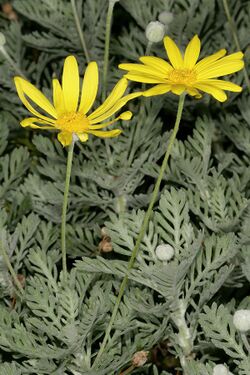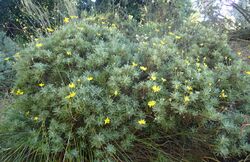Biology:Euryops pectinatus
| Euryops pectinatus | |
|---|---|

| |
| Virides flowers | |
| Scientific classification | |
| Kingdom: | Plantae |
| Clade: | Tracheophytes |
| Clade: | Angiosperms |
| Clade: | Eudicots |
| Clade: | Asterids |
| Order: | Asterales |
| Family: | Asteraceae |
| Genus: | Euryops |
| Species: | E. pectinatus
|
| Binomial name | |
| Euryops pectinatus (L.) Cass.
| |
Euryops pectinatus, the grey-leaved euryops, is a species of flowering plant in the family Asteraceae, endemic to rocky, sandstone slopes in the Western Cape of South Africa (from Gifberg to the Cape Peninsula).[1]
Description

It is a vigorous evergreen shrub growing to 1.5 m (4 ft 11 in) tall and wide, with silvery green, hairy leaves and yellow, daisy-like composite flowers 5 cm (2 in) in diameter.[2] They bloom from early summer through to autumn and into winter in areas with mild climates.
The fruits bear a single seed and are either hairless or covered in myxogenic (slime-producing) hairs, and may also be topped by a pappus of white or brown bristles.[2]
The Latin specific epithet pectinatus means “comb-like”,[3] possibly referring to the deeply-divided, fernlike leaves.
Cultivation
Euryops pectinatus is widely used as a garden plant, especially in urban areas and due to its almost perpetual flowering regime. It grows best in full sun and well-drained deep soils. It must be grown in a sheltered location, away from frost-prone areas. It has gained the Royal Horticultural Society's Award of Garden Merit.[4][5]
Gallery
-
In full bloom
-
Pollinated by Cabbage White
-
A shrub
-
Flower close-up
-
Hedge
References
- ↑ "Euryops pectinatus". SANBI, PlantZAfrica.com. http://pza.sanbi.org/euryops-pectinatus. Retrieved 26 February 2018.
- ↑ 2.0 2.1 "Euryops pectinatus Cass. | Plants of the World Online | Kew Science". http://powo.science.kew.org/taxon/urn:lsid:ipni.org:names:207466-1.
- ↑ Harrison, Lorraine (2012). RHS Latin for Gardeners. United Kingdom: Mitchell Beazley. ISBN 184533731X.
- ↑ "RHS Plant Selector - Euryops pectinatus". https://www.rhs.org.uk/Plants/7107/Euryops-pectinatus/Details. Retrieved 19 June 2020.
- ↑ "AGM Plants - Ornamental". Royal Horticultural Society. July 2017. p. 38. https://www.rhs.org.uk/plants/pdfs/agm-lists/agm-ornamentals.pdf. Retrieved 26 February 2018.
External links
Wikidata ☰ Q3642829 entry
 |






